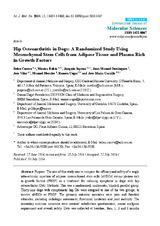Hip Osteoarthritis in Dogs: A Randomized Study Using Mesenchymal Stem Cells from Adipose Tissue and Plasma Rich in Growth Factors
Autor
Cuervo, Belén
Rubio, Mónica
Sopena, Joaquín
Domínguez Pérez, Juan Manuel
José, Vilar
Morales, Manuel
Cugat, Ramón
Carrillo, José María
Editor
MDPIFecha
2014Materia
Adipose derived mesenchymal stem cellsPlasma rich in growth factors
Osteoarthritis
Dogs
Hip
METS:
Mostrar el registro METSPREMIS:
Mostrar el registro PREMISMetadatos
Mostrar el registro completo del ítemResumen
Purpose: The aim of this study was to compare the efficacy and safety of a single
intra-articular injection of adipose mesenchymal stem cells (aMSCs) versus plasma rich
in growth factors (PRGF) as a treatment for reducing symptoms in dogs with hip
osteoarthritis (OA). Methods: This was a randomized, multicenter, blinded, parallel group.
Thirty-nine dogs with symptomatic hip OA were assigned to one of the two groups, to
receive aMSCs or PRGF. The primary outcome measures were pain and function
subscales, including radiologic assessment, functional limitation and joint mobility. The
secondary outcome measures were owners’ satisfaction questionnaire, rescue analgesic
requirement and overall safety. Data was collected at baseline, then, 1, 3 and 6 months post-treatment. Results: OA degree did not vary within groups. Functional limitation, range
of motion (ROM), owner’s and veterinary investigator visual analogue scale (VAS), and
patient’s quality of life improved from the first month up to six months. The aMSCs group
obtained better results at 6 months. There were no adverse effects during the study. Our
findings show that aMSCs and PRGF are safe and effective in the functional analysis at
1, 3 and 6 months; provide a significant improvement, reducing dog’s pain, and improving
physical function. With respect to basal levels for every parameter in patients with hip OA,
aMSCs showed better results at 6 months.

